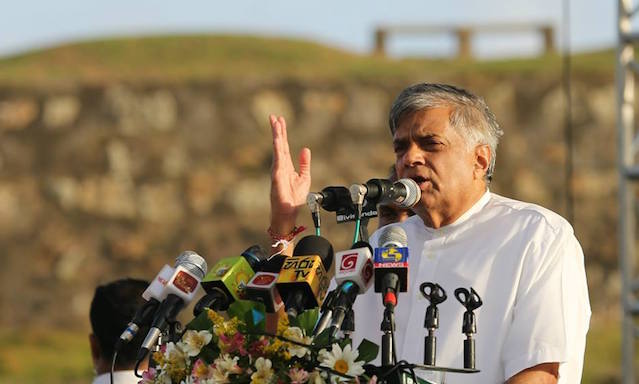A Brief Colonial History Of Ceylon(SriLanka)
Sri Lanka: One Island Two Nations
A Brief Colonial History Of Ceylon(SriLanka)
Sri Lanka: One Island Two Nations
(Full Story)
Search This Blog
Back to 500BC.
==========================
Thiranjala Weerasinghe sj.- One Island Two Nations
?????????????????????????????????????????????????Saturday, August 29, 2015
Steps From victory
By Asanga Abeyagoonasekera –August 28, 2015

After a victory at the recent parliamentary elections, Sri Lanka is seen
by the outside world as a shining example of democratic peaceful
elections and political transition. Our democratic values in society are
far superior to an individual politician.
According to Justice Weeramantry,
“our ancient civilization fore-shadowed concepts of equality, freedom
and democratic procedures in a manner which throws on us the burden of
carrying on these democratic practices and developing them to the best
of our ability”. We have made history by creating a national government
and by signing a MOU between Government and Opposition for the first
time. Prime Minister Ranil Wickremesinghebacked
by his long political career has exercised within the democratic
framework trying to accommodate all voices from many political parties.
As he says “Our aim is to emulate the dignified tradition of King
Lichchavi, whereby people would meet peacefully, discuss issues
peacefully and disperse peacefully, in order to ensure good governance
and build a united and prosperous nation”. The Lichchavi kings had ruled
the Kathmandu area in Nepal from 400 to 750 AD. This period saw the
flowering of a liberal political Culture and coexistence of Buddhism and
Hinduism.
 It was a ballot based silent revolution that changed the Rajapaksa regime on
8th January- orchestrated by the people of Sri Lanka. The people
reaffirmed their verdict at the 17th August Parliamentary elections.
This secured a clear victory for the United National Front for Good
Governance taking 106 seats while the opposition could secure only 95
seats. The new Government with the leadership of the new Prime Minister
Ranil Wickremesinghe will be ready to take Sri Lanka towards 2020. As he
pledged to introduce good governance and fight against corruption to
bring economic prosperity in his election manifesto its time he executes
the promises with the right kind of cabinet ministers.
It was a ballot based silent revolution that changed the Rajapaksa regime on
8th January- orchestrated by the people of Sri Lanka. The people
reaffirmed their verdict at the 17th August Parliamentary elections.
This secured a clear victory for the United National Front for Good
Governance taking 106 seats while the opposition could secure only 95
seats. The new Government with the leadership of the new Prime Minister
Ranil Wickremesinghe will be ready to take Sri Lanka towards 2020. As he
pledged to introduce good governance and fight against corruption to
bring economic prosperity in his election manifesto its time he executes
the promises with the right kind of cabinet ministers.
The four time Prime Minister who understands and knows most politicians
in his political sphere would have to find the art of moving away from
playing prisoners dilemma as he needs to get everyone to cooperate and
move forward not stagnate at one place. According to my fellow Young
Global Leader and Adjunct Prof. Lutfey Siddiqi, “If you and I were to
change our ways together, we could both get to a better place. However,
if I was to change and you were not, I’d be much worse off. And because I
can’t be sure that you will move, I won’t make the move either. These
words demonstrate a classic “prisoners’ dilemma,” where groups of people
settle for a suboptimal outcome because they cannot ensure coordinated
action that could take them all to a better outcome.

